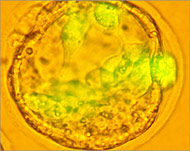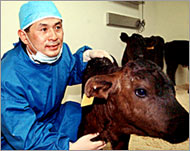Scientist denies faking research
A South Korean scientist whose work is under intense scrutiny has hit back at his accusers, saying he has proof his team had made patient-tailored stem cells this year and he will produce the evidence soon.

Hwang Woo-suk told a televised news conference at Seoul National University on Friday that five frozen stem cells were in the process of being thawed for analysis. He expected results in 10 days.
“Our six research members made 11 stem cells and all confirmed this,” Hwang said. Some cells had been contaminated by a fungus and he planned to ask prosecutors to investigate his suspicion that they may have been tampered with or replaced.
“Who, with what intention, by what measure, who did such a thing?” he said. “I believe this must be unearthed.”
The case has wide ramifications for the already controversial field of stem-cell research and for the prestige of South Korea, where Hwang has become a folk hero.
His team published a study on tailored human stem cells in May in the journal Science. The subject is important as it could one day lead to treatment for spinal injuries, for example.
Paper retraction
Hwang said he was retracting the paper from Science because of the row, even though he did not doubt his findings. He said a follow-up paper sent to another journal would restore faith.
Seoul National University said earlier it would step up an investigation into Hwang, the country’s top stem-cell scientist, after a close collaborator told the media on Thursday that Hwang himself had said some key parts of the paper were fabricated.
Hwang, who turned 53 on Thursday, did not directly address the accusations but said his team had notes and pictures of the process to prove that they had made the stem cells.
 |
|
Hwang had claimed to have made |
“I was so surprised and embarrassed to see the news reports,” he said.
His team at Seoul National University published the first scientific paper on cloning a human embryo in 2004 and this year displayed the world’s first cloned dog.
Lee Un-kyoung, a 37-year-old teacher, said: “I’m so confused about the news. Most Korean people want to believe that Hwang’s assertion is true, but we really need to know the truth. I would feel betrayed if the reports were true.”
Hwang had been under scrutiny since 24 November when he apologised for allowing two junior women researchers to donate their eggs for his work, violating international ethical standards.
Stem cell hub
Two months ago, Roh Moo-hyun, the South Korean president, opened a World Stem Cell Hub centre, billed as a project to put the country at the forefront of cloning research.
David Winickoff, assistant professor of bioethics at the University of California, Berkeley, said: “I am sure anti stem-cell activists will use this to show that there are problems with this science and that it is not effectively regulated.”
 |
|
Hwang is accused of fabrications |
Shares in South Korean firms involved in biotechnology – a key growth area for Asia’s fourth-largest economy – fell by their daily limit of 15% early on and stayed there.
A US cloning and stem-cell expert who had lent his name and prestige to Hwang’s work, Dr Gerald Schatten of the University of Pittsburgh Medical Centre, asked earlier this week to have his name taken off a study he co-authored with Hwang.
On Thursday, Roh Sung-il, a hospital administrator and specialist in fertility studies who worked with Hwang, said his colleague had said there were fabrications in the second study on tailor-made human stem cells.
Tearful conference
Roh repeated those accusations at a conference on Friday after Hwang’s briefing.
 |
|
Hwang posed with a cloned cow |
He said nine of the 11 stem-cell lines – batches – that were part of the tailored stem study paper were fabricated and the authenticity of the other two was questionable.
Reports in South Korean media said some photographic images of the stem-cell lines may have been manipulated to appear as if there were 11 separate lines.
Hwang had recently asked Science to correct some images in his study, which Science said did not change any of the findings.
Cho Sun-young, a 27-year-old office worker, said: “I feel so bad for Dr Hwang and sorry for this kind of absurd situation. But for now, I would like to trust what Hwang said.”